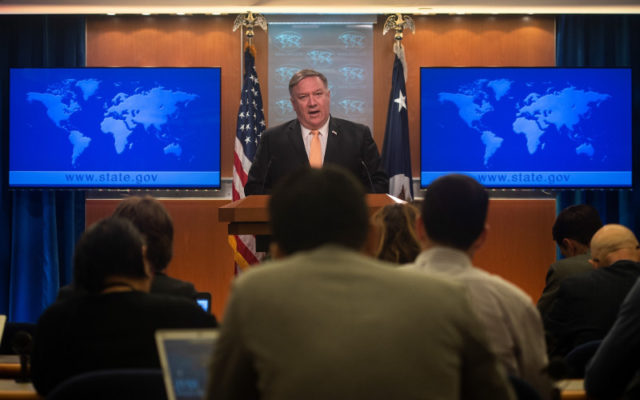Editor's Note: The following text is a summary of today's conference call.
Lessons U.S. policy makers should have learned in dealing with Iran since the police state theocracy of ayatollahs Ruhollah Khomeini and his successor, Ali Khamenei took over in 1979:
The regime is neither Islamic nor Iranian, despite its self-description as the Islamic Revolutionary Republic of Iran. Not if Iran is heir to Persian civilization. And not if rule by clergy lies outside the Shi’ite Islamic mainstream.
But today’s Iranian government has been and continues to be “the chief sponsor of terrorism around the world” and unyielding enemy of “the Great Satan”—the United States—and “the Little Satan”—Israel.
So says Richard Goldberg, a senior advisor at the Foundation for the Defense of Democracies, a Washington, D.C.-based think tank. He told participants in a Jewish Policy Center conference call March 17 that the Trump administration’s “maximum pressure” campaign appears to have resulted in “the regime reaching a tipping point.”
Under strong U.S. economic sanctions that also squeeze Iran’s access to other international trade, Tehran may be losing its balance, said Goldberg. “We just don’t know how long” it might take.
Plunging value of the Iranian rial, the recent drop in global oil prices and impact of the corona virus—reportedly hitting Iran harder than any other country except China—keeps pushing the mullahs to take “more drastic action,” he said. But the Trump administration’s decision to assassinate Islamic Revolutionary Guard Corps Gen. Qasem Soleimani in January told Iranian leaders aggression would cost them.
Goldberg previously served as chief of staff to Gov. Bruce Rauner (R-Ill.) and deputy chief of staff and senior foreign policy advisor to former U.S. Sen. Mark Kirk (R-Ill.). He said Iranian provocations have included breaking limits to its nuclear program contained in the 2015 Joint Comprehensive Plan of Action, the attack on a major Saudi Arabia oil refinery and rocketing of U.S. forces in Iraq by Iranian-allied militia.
These are meant to frighten the Europeans (Germany, France and the United Kingdom, as well as Russia and China joined in the JCPOA negotiations led by the Obama administration), intimidate the Sunni Muslim-led Gulf states and pressure the United States while avoiding open warfare. Meanwhile, according to Goldberg, Iran continues to pursue a nuclear weapons capability the 2015 deal was supposed to constrain, temporarily.
The Islamic Republic pursued “a secret nuclear program for years,” he noted. Even after exposure and accepting the JCPOA, Iran blocks access to secret sites by the International Atomic Energy Agency, Goldberg said. The IAEA is charged with monitoring Iranian compliance.
In 2018, Israel’s external intelligence agency, the Mossad, exposed Iran’s previously secret archive on nuclear research and development, Goldberg noted. Tehran continues a ballistic missile program “to have [delivery] capabilities when the Supreme Leader wishes.” Iran also maintains SPND, “a shady group led by the founders of Iran’s nuclear program.”
Iran’s denial of IAEA inspection of undeclared nuclear sites means it is “hiding some nuclear material,” Goldberg asserted. Tehran does so while declaring it has no nuclear ambitions, he added.
Goldberg reminded JCP conference call participants that Iran has been at war with the United States since the 1979 seizure of the American embassy and subsequent 444-day imprisonment of 52 diplomats and other personnel, the 1980s’ bombings of the American embassy and Marine Corps barracks in Lebanon, 1990s’ Khobar Towers bombing in Saudi Arabia that killed 19 U.S. service members, and supplying improvised explosive devices (IEDs) to militia that killed approximately 500 GIs in Iraq.
It continues to spread terrorism internationally “by proxies including Hezbollah, the Houthis in Yemen” and attempts to “encircle Israel.” Internally, the mullahs’ abuse of the Iranian people is “horrible,” Goldberg said. For example, regime forces killed “1,500 people in the streets late last fall to protest economic austerity.”
Europeans, and even officials in the Defense and State departments urged President Trump to ease off “maximum pressure,” Goldberg said. But the president concluded tightening the economic vise on Iran was the only way to leverage a better deal than the JCPOA, the restrictions of which were only on nuclear matters, not missile development, conventional weapons acquisition or terrorism sponsorship and included sunset provisions that begin to take effect this October.
The White House decision to end remaining waivers on oil exports boxed in the mullahs even before the latest oil price drop and corona virus onslaught. Hence Iran’s string of provocations, and what Goldberg called a sophisticated influence campaign aimed at the Europeans and news media in particular and intended to make Tehran look like the aggrieved party.
“Today it seems obvious we would have gotten out” of the JCPOA, he said. “But it wasn’t” before Trump took office. Now Washington has “a clear and simple strategy … maximum leverage with maximum demands … to achieve maximum results” like the 12 points enunciated by Secretary of State Mike Pompeo in a May, 2018 speech. These require “wholesale change” in Iran’s behavior—in short, acting internationally “like a normal country”—to receive “wholesale change” in American policy.
Previous conventional wisdom, according to Goldberg, held that “the Europeans could punish their companies that complied with U.S. sanctions,” arrange an alternative trade scheme to sidestep SWIFT (Society for Worldwide Interbank Financial Transactions) and avoid American banks and commercial law. He said this proved false after U.S. withdrawal from the JCPOA because even China and Russia valued access to American markets more than trade with Iran.
Noting that Supreme Leader Khamenei is 80 and reportedly not in good health, Goldberg said succession is uncertain. There are a number of potential competitors inside and outside the regime. But rather than attempt to engineer a new, friendly government from outside, “it behooves us not to get too wedded to any person or movement … but be ready to support those who might support a more normal Iran.”






